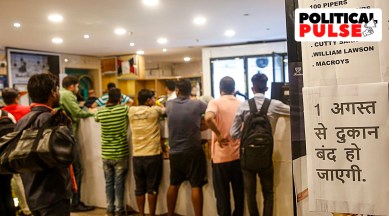Behind Kejriwal govt liquor policy flip-flop: L-G heat, Sisodia under cloud, rollout fiasco
When it was in the planning stages, Deputy CM Manish Sisodia, who handles the excise portfolio, had said that the new policy was aimed at curbing corruption and sale of illegal alcohol.

The decision of the Arvind Kejriwal-led Aam Aadmi Party (AAP) government in Delhi to roll back its new excise policy for 2021-22 and revert to the old policy is a major setback for the AAP dispensation.
The Delhi government’s new liquor policy, launched in November last year, witnessed a troubled rollout and has been under the scanner of Delhi Police’s Economic Offences Wing (EOW) amid a face-off between Lt Governor Vinai Kumar Saxena and Kejriwal.
monthly limit of free stories.
with an Express account.
When it was in the planning stages, Deputy CM Manish Sisodia, who handles the excise portfolio, had said that the new policy was aimed at curbing corruption and sale of illegal alcohol and that it would ensure a more equitable distribution of liquor shops in the capital.
One of the key changes the policy ushered in was that the Delhi government exited the business of selling liquor entirely. The second major change it brought in the city’s liquor trade was in the way the revenue was to be generated from private vendors. Instead of taking 25% VAT on sales, the government had initiated a bidding process of 32 zones. Most of the money would be paid by the vendors as part of the license fee and only 1% would be charged as VAT on the sale of alcohol. At the time, Sisodia had also said that this would boost transparency in the alcohol sale as the licensee would have no incentive to fudge sale figures.
With L-G Saxena now recommending to the BJP-ruled Centre that the CBI probe Sisodia’s role in making changes to the excise policy without the Delhi Cabinet’s assent and in waivers worth Rs 144 crore allegedly given to vendors, the policy as well as its implementation has come under a cloud.
Since it stormed to power in Delhi in 2015, the AAP government has been accused by a section of bureaucracy of allegedly bulldozing procedures, ignoring their advice and not compromising when it came to implementation of various policies.
According to sources, the Kejriwal government had been at loggerheads with the Transport Department officials over the procurement of buses for several months. The files related to the installation of CCTV cameras in the city had also been stuck for months. More recently, the Delhi Cabinet cleared the doorstep delivery of ration and sent its file to the L-G for clearance, but it was blocked as the Centre made it clear that grains under the National Food Security Act (NFSA) could not be used in any way other than the existing method of selling it in fair price shops.
According to a senior bureaucrat, the “brute majority” that the AAP came to power with besides the protracted inertia in bureaucracy could be blamed for the Kejriwal government’s problems in its first three years.
“When AAP came to power in 2015, it almost completely swept away the Opposition. There was no one to question them in the Assembly. They had expected bureaucracy to behave in a similar manner. But the hostility from the Centre, especially via the office of the L-G, along with ignorance regarding procedures, made it difficult for the Delhi government initially. Over the years, however, the government has learnt many lessons. The new liquor policy is not an example of them not following procedures while formulating it, but of a lack of understanding of the nature of this business,” the official said.
According to informed officials, the trouble with the liquor policy started well before allegations of corruption were levelled against officials as well as minister Sisodia.
“Problems started within days of the tenders being awarded. Many shops came up in non-conforming areas, near schools and places of worship. In some places, residents of the area did not want a liquor vend near their homes. As a result, many shops didn’t even start. Then, when shops started offering heavy discounts on the sale of alcohol, there were massive protests, and people also went to court against it. The government then decided to do away with discounts for a while, even though it was something allowed in the policy. It was after this that vendors started exiting the business in Delhi, leaving many areas unserved. As the new policy was not renewed even as the financial year began, other vendors too realised they were making losses and decided to exit. Now, almost half the liquor shops are shut (in the city),” an official said on condition of anonymity.